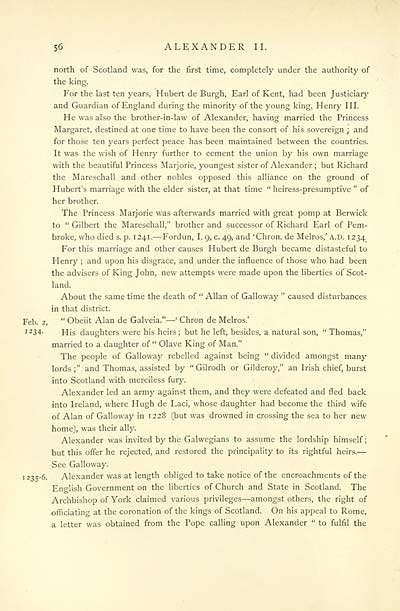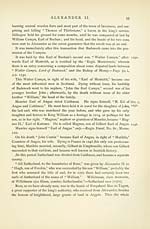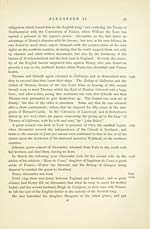Family records of the Bruces and the Cumyns
(68) Page 56
Download files
Complete book:
Individual page:
Thumbnail gallery: Grid view | List view

56 ALEXANDER II.
north of Scotland was, for the first time, completely under the authority of
the king.
For the last ten years, Hubert de Burgh, Earl of Kent, had been Justiciary
and Guardian of England during the minority of the young king, Henry III.
He was also the brother-in-law of Alexander, having married the Princess
Margaret, destined at one time to have been the consort of his sovereign ; and
for those ten years perfect peace has been maintained between the countries.
It was the wish of Henry further to cement the union by his own marriage
with the beautiful Princess Marjorie, youngest sister of Alexander ; but Richard
the Mareschall and other nobles opposed this alliance on the ground of
Hubert's marriage with the elder sister, at that time " heiress-presumptive " of
her brother.
The Princess Marjorie was afterwards married with great pomp at Berwick
to " Gilbert the Mareschall," brother and successor of Richard Earl of Pem-
broke, who died s. p. 124.1. — Fordun, I. 9, c. 49, and 'Chron. de Melros,' A.D. 1234
For this marriage and other causes Hubert de Burgh became distasteful to
Henry ; and upon his disgrace, and under the influence of those who had been
the advisers of King John, new attempts were made upon the liberties of Scot-
land.
About the same time the death of " Allan of Galloway " caused disturbances
in that district.
Feb. 2, " Obeiit Alan de Galveia." — ' Chron de Melros.'
I2 34- His daughters were his heirs; but he left, besides, a natural son, "Thomas,"
married to a daughter of " Olave King of Man."
The people of Galloway rebelled against being " divided amongst many
lords ;" and Thomas, assisted by " Gilrodh or Gilderoy," an Irish chief, burst
into Scotland with merciless fury.
Alexander led an army against them, and they were defeated and fled back
into Ireland, where Hugh de Laci, whose daughter had become the third wife
of Alan of Galloway in 1228 (but was drowned in crossing the sea to her new
home), was their ally.
Alexander was invited by the Galwegians to assume the lordship himself;
but this offer he rejected, and restored the principality to its rightful heirs. —
See Galloway.
1235-6. Alexander was at length obliged to take notice of the encroachments of the
English Government on the liberties of Church and State in Scotland. The
Archbishop of York claimed various privileges — amongst others, the right of
officiating at the coronation of the kings of Scotland. On his appeal to Rome,
a letter was obtained from the Pope calling upon Alexander " to fulfil the
north of Scotland was, for the first time, completely under the authority of
the king.
For the last ten years, Hubert de Burgh, Earl of Kent, had been Justiciary
and Guardian of England during the minority of the young king, Henry III.
He was also the brother-in-law of Alexander, having married the Princess
Margaret, destined at one time to have been the consort of his sovereign ; and
for those ten years perfect peace has been maintained between the countries.
It was the wish of Henry further to cement the union by his own marriage
with the beautiful Princess Marjorie, youngest sister of Alexander ; but Richard
the Mareschall and other nobles opposed this alliance on the ground of
Hubert's marriage with the elder sister, at that time " heiress-presumptive " of
her brother.
The Princess Marjorie was afterwards married with great pomp at Berwick
to " Gilbert the Mareschall," brother and successor of Richard Earl of Pem-
broke, who died s. p. 124.1. — Fordun, I. 9, c. 49, and 'Chron. de Melros,' A.D. 1234
For this marriage and other causes Hubert de Burgh became distasteful to
Henry ; and upon his disgrace, and under the influence of those who had been
the advisers of King John, new attempts were made upon the liberties of Scot-
land.
About the same time the death of " Allan of Galloway " caused disturbances
in that district.
Feb. 2, " Obeiit Alan de Galveia." — ' Chron de Melros.'
I2 34- His daughters were his heirs; but he left, besides, a natural son, "Thomas,"
married to a daughter of " Olave King of Man."
The people of Galloway rebelled against being " divided amongst many
lords ;" and Thomas, assisted by " Gilrodh or Gilderoy," an Irish chief, burst
into Scotland with merciless fury.
Alexander led an army against them, and they were defeated and fled back
into Ireland, where Hugh de Laci, whose daughter had become the third wife
of Alan of Galloway in 1228 (but was drowned in crossing the sea to her new
home), was their ally.
Alexander was invited by the Galwegians to assume the lordship himself;
but this offer he rejected, and restored the principality to its rightful heirs. —
See Galloway.
1235-6. Alexander was at length obliged to take notice of the encroachments of the
English Government on the liberties of Church and State in Scotland. The
Archbishop of York claimed various privileges — amongst others, the right of
officiating at the coronation of the kings of Scotland. On his appeal to Rome,
a letter was obtained from the Pope calling upon Alexander " to fulfil the
Set display mode to:
![]() Universal Viewer |
Universal Viewer | ![]() Mirador |
Large image | Transcription
Mirador |
Large image | Transcription
Images and transcriptions on this page, including medium image downloads, may be used under the Creative Commons Attribution 4.0 International Licence unless otherwise stated. ![]()
| Histories of Scottish families > Family records of the Bruces and the Cumyns > (68) Page 56 |
|---|
| Permanent URL | https://digital.nls.uk/95071802 |
|---|
| Description | A selection of almost 400 printed items relating to the history of Scottish families, mostly dating from the 19th and early 20th centuries. Includes memoirs, genealogies and clan histories, with a few produced by emigrant families. The earliest family history goes back to AD 916. |
|---|

